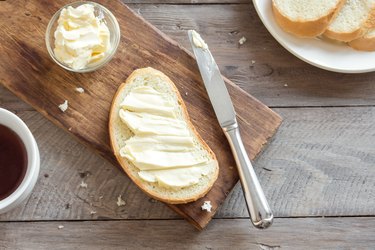
When it comes to matters of health, margarine usually wins out over butter any day. Since margarine is made from vegetable oils, it's also made of polyunsaturated and monounsaturated fats, which are commonly known as the "good fats," thought to help reduce cholesterol overall. However, that doesn't mean you should go slathering on the margarine just yet.
Dietary Guidelines for 2015-2020 from the Office of Disease Prevention and Health Promotion suggests limiting overall fat intake and putting an emphasis on healthy fats. Put your heart first with a seven-day low-cholesterol meal plan.
Video of the Day
Video of the Day
Cholesterol Level Recommendations
According to the Centers for Disease Control, nearly 102 million adults in the United States have high cholesterol levels. Having elevated cholesterol blood levels increases risk for heart disease and stroke, which can be particularly scary since there are often no symptoms. According to the Journal of the American College of Cardiology, adult cholesterol levels should be somewhere between 40 to 60 mg/dL (milligrams per deciliter) for men and women.
What Is Margarine Made Of?
Made from vegetable oil, margarine is often considered a healthier alternative to traditional butter. A lot goes into the creation of margarine, from a process designed to make it solid to the use of additives, emulsifiers and colors to give it that buttery feel. In short, margarine is a highly processed food product.
Read more: Butter Substitutes to Improve Cholesterol
Healthy Margarine Brands
When it comes to healthy margarine, Smart Balance may come to mind. With no hydrogenated or partially hydrogenated oils, Smart Balance may be one of the best cholesterol-reducing margarine brands on the market. Additionally, it contains zero trans fat.
Smart Balance margarine items are, instead, chock-full of good-for-you omega-3s, vitamins, calcium and protein. And Smart Balance doesn't just stick to butter alternatives. Among the company's other products is a flax-oil-infused peanut butter for a heart-healthy sandwich spread.
Plant-Based Margarine
Made with plant stanol ester, Benecol margarines are proven to lower cholesterol levels, according to the company's website. Often found in corn and rye, plant sterols and margarine with plant sterols work by partially blocking the intake of cholesterol by the gut, so less is absorbed into your bloodstream. Benecol margarine spreads may be an ideal butter substitute if you aren't interested in compromising on taste, but still want to keep cholesterol levels under control.
Read more: Foods Fortified With Plant Sterols or Stanols
Can You Believe?
I Can't Believe It's Not Butter claims to keep things simple by combining plant-based oils, purified water and salt for a timeless recipe that people have loved for years. With 60 calories per serving and 70 percent less saturated fat than butter, this healthy margarine brand allows you to enjoy a buttery taste without the guilt.
Healthier Alternatives
Making the switch from butter to margarine may help you cut a few calories but probably not so many that you'll notice a huge difference. And although those creamy yellow spreads are a widely embraced staple in American cooking culture, there are alternatives. Perhaps most important is that they are actually healthier options.
Try turning to olive oil and other plant- or nut-based oils and spreads the next time you start to reach for that little yellow stick. Perhaps consider a drizzle of olive oil on your bread or baked potato rather than butter or margarine. Nevertheless, margarine can have a place in your diet as long as you stick to the all-things-in-moderation approach.
- Mayo Clinic: Which Spread Is Better for My Heart — Butter or Margarine?
- Journal of the American College of Cardiology: Guideline on the Management of Blood Cholesterol
- Smart Balance: Why We're Different
- Benecol: What Is Benecol?
- I Can't Believe It's Not Butter: What We're Made Of
- Harvard Health Publishing: Butter vs. Margarine
- Centers for Disease Control and Prevention: High Cholesterol Facts
- Health.gov: Dietary Guidelines 2015-2020
Is this an emergency? If you are experiencing serious medical symptoms, please see the National Library of Medicine’s list of signs you need emergency medical attention or call 911.